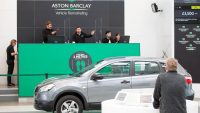New car sales grew by more than a quarter in June with 177,266 vehicles registered during the month, the SMMT said today.
Figures published this morning show the new car market rose by 25.8 per cent in June versus the same month last year.
It marked the 11th consecutive month of growth as the industry gradually overcomes the supply chain shortages caused by the pandemic, which held back production for much of the previous two years.
The trade body said: ‘With waiting times easing and pent-up demand being met, the sector is a rare bright spot in a gloomy economic landscape even though overall market volumes remain below pre-pandemic levels.’
June 2019 saw 223,421 units registered
The growth was mainly driven by large fleet registrations, which went up by 37.9 per cent to 92,699 units, which the SMMT said reflected the normalisation of supply.
Private demand grew more modestly, though – it was up by 14.8 per cent to 79,798 units.
Deliveries of petrol cars increased 22.7 per cent to remain the most popular powertrain, while those of hybrids and plug-in hybrids also rose, by 40.1 per cent and 65.5 per cent respectively.
Diesel registrations were down 13.5 per cent but battery-electric vehicle (BEV) registrations rose again, with the segment up 39.4 per cent as 31,700 buyers chose to get behind the wheel of a zero-emission car – 17.9 per cent of the total market.
The best-selling car in June was the Tesla Model Y with 5,539 units shifted. It was followed by the Ford Puma (5,453) and Vauxhall Corsa (4,146) in second and third place respectively.
Fourth was the Hyundai Tucson (3,588), while the fifth best-selling vehicle was the Nissan Juke (3,256).
They were followed by the Nissan Qashqai (3,232), Mini (3,222), Toyota Yaris (3,162), Kia Sportage (3,081) and Vauxhall Mokka (3,034) to round off the top 10.
Almost a million (949,720) new cars joined UK roads in the first six months of 2023, with total registrations up 18.4 per cent and BEV uptake at record levels with 152,968 deliveries so far this year – some 13 times greater than the same period in 2019 when 11,975 BEVs were registered.
The BEV market share for 2023 now stands at 16.1 per cent, but the SMMT said that with a zero-emission vehicle mandate requiring 22 per cent BEV registrations per manufacturer due to come into force in under six months, more needed to be done to accelerate the transition.
Recharging an EV at home can offer a 60-70 per cent cost per mile saving compared with refuelling a petrol or diesel vehicle, said the SMMT, which urged a cut in VAT on public charging to help quicken uptake.
Drivers who can charge at home pay just five per cent VAT to power up their EV, versus 20 per cent for those who rely on the public network.
SMMT chief executive Mike Hawes said: ‘The new car market is growing back and growing green, as the attractions of electric cars become apparent to more drivers. But meeting our climate goals means we have to move even faster.
‘Most electric vehicle owners enjoy the convenience and cost saving of charging at home, but those that do not have a driveway or designated parking space must pay four times as much in tax for the same amount of energy.
‘This is unfair and risks delaying greater uptake, so cutting VAT on public EV charging will help make owning an EV fairer and attractive to even more people.’
What the industry says
Sun is shining brightly on car industry
It’s been another bumper month for new car sales – the storm clouds of last year are now a distant memory and finally the sun is shining brightly on the car industry.
While petrol cars are still the biggest sellers, it’s no shock that EV sales are continuing to take an ever-increasing slice of the market.
If the industry and government can convince even more drivers that EVs are the way forward, we’ll be going a long way towards securing a greener new car market for the future.
Alex Buttle, co-founder, Motorway.co.uk
Rising cost of living is affecting buying decisions
Although electric car registrations continue to rise, our own survey data shows consumers are continuing to be affected by the rising cost of living, with more than a third stating that their car-buying decisions have been negatively affected.
That has led to them either delaying their purchase or choosing a different model than they initially intended.
This is highlighted in the declining number of private vehicle purchases. Manufacturers are responding, however, with electric car discounts rising significantly since the start of the year, meaning it’s more important than ever for consumers to shop around.
Steve Huntingford, editor, What Car?
Increase should lead to used car stock influx
Another monthly and year-on-year increase highlights the automotive industry’s robust performance, as well as continued consumer demand despite the financial burdens tied to the ongoing cost-of-living crisis and economic uncertainty.
The wider macro-economic picture and inflationary pressures may in time dampen demand and impact on new car registrations but, for now, the industry remains resilient with no imminent signs of a downturn.
An increase in new car registrations should also facilitate an influx of stock into the used market, enabling more choice and availability for consumers.
It will, however, be interesting to see if demand for alternative fuel vehicles can be sustained throughout the year, as positive figures are somewhat skewed by fleet registrations.
Lisa Watson, director of sales, Close Brothers Motor Finance
Surge still has miles to run
The surge in new car sales still has more miles left to run, having posted an 11th successive month of increasing year-on-year registrations.
The easing of supply chain pressures, coupled with four straight months of increasing UK car production, is helping to get keys into drivers’ hands at a much quicker rate.
That sales continue to increase on an annual basis despite stubbornly high inflation and rising interest rates points to the resilience of the UK car market.
EV sales remain a big success story, but there are signs that the rate of increase is slowing down.
Mark Oakley, director, AA Cars
Increasing array of EV deals stimulating demand
Our figures show the electric share of the new car market enjoyed a much-needed boost in June – taking 15 per cent of new car advert views, up from 11 per cent in March – due to advertising by brands promoting electric models.
After several months of low EV interest, this is welcome news and shows that the increasing array of deals from the likes of Tesla that have hit the market in recent weeks are already stimulating demand.
Ian Plummer, commercial director, Auto Trader



































